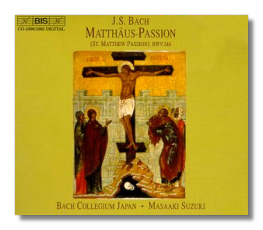
The Internet's Premier Classical Music Source
Related Links
- J.S. Bach Reviews
- Latest Reviews
- More Reviews
-
By Composer
-
Collections
DVD & Blu-ray
Books
Concert Reviews
Articles/Interviews
Software
Audio
Search Amazon
Recommended Links
Site News
 CD Review
CD Review
Johann Sebastian Bach

St. Matthew Passion
- Gerd Türk, tenor (Evangelist)
- Peter Kooij, bass (Jesus)
- Nancy Argenta, soprano
- Robin Blaze, counter-tenor
- Makoto Sakurada, tenor (Testis II)
- Chiyuki Urano, bass (Judas, Petrus, Pilatus, Pontifex)
Bach Collegium Japan/Masaaki Suzuki
BIS CD-1000/1002 DDD 3CDs: 69:37, 53:52, 42:14
Suzuki's traversal of Bach's choral works has been met with pleasure, and this new release is bound to receive similar praises. This is performance that flows with uncommon inevitability, and yet its mood, in spite of Suzuki's quick tempos, is devout. The drama of Christ's betrayal and crucifixion is not so much downplayed as it is transformed; the resurrection is never in doubt, and so this St. Matthew Passion brings consolation and peace where others bring tragedy.
This recording uses period instruments. The musicianship behind them is solid, and there is no doubt that we've come a long way since period instruments became the vogue. (If anything, we're on the other side of that wave now.) The instruments bring a touching vulnerability to this performance. The combination of flute and oboes in the soprano's "Aus Liebe, aus Liebe will mein Heiland sterben, …" is uniquely beautiful, and there are many examples of the felicitous matching of instruments both with each other and with human voices. The intimacy of this St. Matthew Passion is reinforced by the size of the choruses; each has 13 to 15 members divided among the four voice parts. Integration is this recording's strength; even the "big" arias fit into the overall fabric of the work without stopping the action or calling undue attention to themselves.
The singers are a strong group. Türk and Kooij were chosen, I believe, not for the beauty of their voices, but for their ability to characterize and communicate within the smaller scale of Suzuki's overall concept. Argenta is very attractive in her solos. Robin Blaze, a male counter-tenor sings the "alto" solos, although Bis's notes are not entirely clear about this point. He is not as personable as Argenta, but his singing is controlled, intelligent, and easy on the ear. Bass Chiyuki Urano fills several roles here, and it is quite a challenge for him to act as protagonist, antagonist, and bystander at different times. He doesn't appear to have a large voice, but it is a flexible one, and technique is no problem for him.
Another positive feature of this disc is the booklet. The notes by the conductor and by Tadashi Isoyama are interesting and go way beyond the usual historial perspectives provided by most other annotators.
BIS has got a winner here. This St. Matthew Passion is especially recommended to anyone who finds this work intimidating. Suzuki takes us gently by the hand and shows us Bach not at his most imposing, but at his most humane.
Copyright © 2000, Raymond Tuttle

















